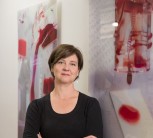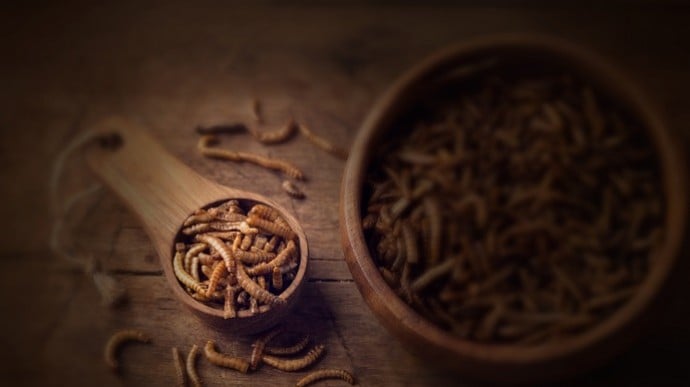Professor Lyn-Marie Birkholtz is a full professor in Biochemistry at the University of Pretoria (UP) and has been the South African Research Chair (SARChI) in Sustainable Malaria Control since 2013. She leads efforts to target malaria parasites to contribute to malaria elimination strategies. Her work recently led to the discovery of new chemical entities that have the potential to block malaria parasite transmission and aid malaria elimination strategies (Nature Communications, January 2021).
Prof Birkholtz did her BSc in Genetics, Human Physiology and Biochemistry, and her PhD in Biochemistry at UP (jointly performed in South Africa and Germany). This was followed by postdoctoral fellowships in Germany and the US. She leads the Parasite Cluster within the UP Institute for Sustainable Malaria Control.
“With key platforms like the UP Institute for Sustainable Malaria Control, the Genomics Institute and continuous new developments – for example, under a One Health sphere with transdisciplinary research – UP is perfectly positioned for our research focus,” she says.
Prof Birkholtz is principal investigator of the Malaria Parasite Molecular Laboratory, and has a keen interest in the fundamental processes that drive parasitism and how this sustains global health challenges. She hopes to translate her research outcomes into meaningful, tangible health innovations, particularly to discover new antimalarial drugs.
Her research group works at the interface of parasite biology and drug discovery, and uses new biological insights as a catalyst for drug discovery. They do this by obtaining an in-depth understanding of the essential processes that drive the survival and pathogenesis of malaria parasites; this is a substantial research challenge that they approach from a systems level.
Prof Birkholtz’s work focuses on the pathogenic processes that drive the proliferation and differentiation of malaria parasites to deliver drugs that are able to target both these forms of the parasite. In line with international endeavours to achieve malaria elimination, her research uses high-content biological information of malaria parasites to support sustained discovery of malaria control chemotherapies in order to contribute to the global Malaria Eradication Research Agenda.
The Parasite Cluster of the UP Institute for Sustainable Malaria Control is a transdisciplinary research entity that spans all 11 UP faculties. Prof Birkholtz works closely with various experts in several faculties, specifically driving projects between the Natural and Agricultural Sciences and Health Sciences faculties.
Internationally, she leads the transdisciplinary Community of Practice (CoP), which brings researchers across South Africa, Africa and the world together to evaluate malaria elimination innovations. “As a group, we work directly with external stakeholders, such as provincial and government-level malaria control programmes and international bodies, including the World Health Organisation and Medicines for Malaria Venture,” the professor explains. “This allows for meaningful translation of our work. The CoP synergised the work by six SARChI Chairs from UP, Stellenbosch University, the University of Cape Town [UCT] and Wits University, allowing for an extraordinary opportunity for cooperation in South Africa.”
A recent milestone for Prof Birkholtz was the delivery of chemical entities that are able to kill malaria parasites, but specifically, able to kill multiple forms of malaria parasites including the elusive transmissible forms. This discovery was part of a long-standing collaboration between UP, Wits, UCT and the Council for Scientific and Industrial Research. “We are building on this discovery by further profiling and developing these transmission-blocking entities through a Grand Challenges Africa grant, awarded by the Bill & Melinda Gates Foundation and managed by the Alliance for Accelerating Excellence in Science in Africa and the African Academy of Sciences,” she says.
Prof Birkholtz is a National Research Foundation B2-rated scientist and was recognised by UP as an Exceptional Young Researcher in 2010 and 2013, and as an Exceptional Academic Achiever between 2019 and 2021. She received the Vice-Chancellor’s Exceptional Supervisor Award and the National Science and Technology Forum’s Science Communication Award in 2018. She is also an elected member of the Academy of Science of South Africa.
Prof Birkholtz is passionate about training the next generation of young scientists in the cutting-edge technologies used in her programme. To date, 19 PhD and 30 master’s students have worked under her (co)-supervision, with several graduates having been awarded international fellowships.
More from this Researcher
Professor Tiaan de Jager is serving his second term as Dean of the Faculty of Health Sciences at the University of Pretoria (UP). He is a professor in Environmental Health at UP’s School of Health Systems and Public Health (SHSPH) and holds an Extraordinary Professorship in the section Andrology at the University’s Department of Urology, School of Medicine.
Prof De Jager, who completed his undergraduate studies at Free State University, says his research interest was piqued in 1993 when he became a medical natural scientist at UP’s Department of Urology in the Faculty of Health Sciences and its academic partner Steve Biko Academic Hospital. His research career officially kicked off when he enrolled for a PhD in Reproductive Biology at UP in 1995.
He is doing research at the University because it is a leading research institution that is not only graduating the leaders of tomorrow but has as its vision the creation of new knowledge with the aim of making a difference locally and globally. Prof De Jager says he is proud to be part of this visionary institution and fortunate to be able to lead and conduct research within this framework. “We focus our activities and contribution to making an impact on society above all else,” he says. “It is important to me that we graduate students who are not only good at their jobs and well educated, but who also understand that they have a responsibility to be life-changers and that they need to impact society and contribute positively to change in Africa.”
The attainment of the 2030 Agenda for Sustainable Development Goals (SDGs) is a common thread throughout Prof De Jager’s research, which places a specific focus on SDG 3 (Good Health and Well-being). “My primary research focus is on male reproductive health, specifically related to environmental health and toxicology,” he explains. “I investigate the effects of environmental endocrine-disrupting chemicals (EDCs), including insecticides used for malaria vector control, such as dichlorodiphenyltrichloroethane (DDT), on male reproductive health.”
The link between male reproductive health and malaria control has resulted in several international research projects that deal with the impact of malaria and associated malaria control on communities where the disease is prevalent, including South Africa, Botswana, Zimbabwe, Mozambique and Malawi. These novel research concepts are fed into safer malaria control strategies, which include drug discovery solutions; policy and regulatory framework intervention; prevention with public health partners; and education and awareness raising.
Prof De Jager is the Director of the UP Institute for Sustainable Malaria Control (UP ISMC), which is a prime example of cross-faculty research. This transdisciplinary institute involves all nine UP faculties as well as the Gordon Institute of Business Science school. The UP ISMC coordinates and promotes collaborative research on safer, more sustainable malaria control and management strategies, generates new knowledge and supports new activities pertaining to safe malaria control in Africa.
“Our interactions and collaborations, however, are not limited to the confines of UP, but includes partners from all spheres,” Prof De Jager says. “This includes communities, government, private industry, and international partners based at research institutions, higher education institutions and science councils.”
As Director of the UP ISMC, Prof De Jager’s main agenda is researching and coordinating efforts to bring about sustained control, eventually leading to the elimination of malaria, starting in South Africa and extending to neighbouring countries like Botswana, Mozambique, Zimbabwe and Malawi.
“Communities affected by malaria need to take responsibility for the control of mosquito vectors and the prevention of bites, while healthcare providers need to take responsibility for early-warning systems and treatment to alert communities to the presence of possible outbreaks,” says Prof De Jager.
Vector control efficacy and malaria treatment services rely on the commitment of and buy-in from provincial and national governments, as poor communities are unable to carry the costs themselves.
In South Africa, malaria is most prevalent in the Vhembe District in Limpopo. Here, malaria control policies rely on indoor residual spraying, using chemicals such as DDT and pyrethroids to control mosquito vectors. “Based on the evidence of the danger that DDT poses to both human (Bornman et al. 2018) and natural ecosystems, we have started developing and exploring alternative methods of control,” Prof De Jager explains. “In the Vhembe District, we have tested indoor polyethylene wall linings impregnated with long-lasting insecticides, with great success (Kruger et al. 2015), and in Botswana and Zimbabwe, we have field-tested the efficacy of microbial larvicides to control mosquito larvae (Mpofu et al. 2016). Both these methods have the potential to be effective if local communities are supported by municipal and provincial agencies based on sound research methodologies.”
The institute has seen several highlights over the past few years, one of the most recent being a breakthrough in 2020 amid the challenges brought on by the COVID-19 pandemic. “We had a breakthrough relating to drug discovery, where we were trying to find compounds to block the parasite interaction,” Prof De Jager explains. “Our research group, under the lead of Prof Lyn-Marie Birkholtz along with local and international partners, focused their research on the parasite and found specific drug compounds that can be effectively used as part of an intervention. This is a major breakthrough in terms of our malaria research.”
Other highlights span a longer period; a few noteworthy examples include the UP ISMC being designated as one of three South African Medical Research Council-collaborating centres for malaria research in the country; the UP ISMC being host to the DSI/NRF SARChI Chair on Sustainable Malaria Control (Prof Birkholtz); and the institute being named winner of the Communication for Outreach and Creating Awareness of SET and Innovation Award at the 2017/2018 NSTF-South32 Awards.
Some of Prof De Jager’s personal research highlights include successfully graduating several postgraduate students. Also, many of his students have won awards at the annual Faculty Research Day where their research projects were presented. His appointment as an expert peer reviewer of the World Health Organisation’s (WHO) ‘Global assessment of the state of the science of endocrine disruptors’ document was another highlight, as was his appointment by the National Minister of Health to the South African Malaria Elimination Committee.
Over the past 18 months, Prof De Jager says he has dedicated his time to further developing and growing the UP ISMC, with the long-term aim of malaria control and elimination. Various experts and role players from UP and government are currently involved. “The UP ISMC is developing safer alternatives for malaria control, including chemical product design/development, which includes WHO Phase II and III Field Trials on new patents for malaria vector control [Prof Walter Focke, Chemical Engineering], health impact/toxicology/health risk [Prof Riana Bornman, SHSPH, who Prof De Jager credits as his research mentor] and integrated vector management/decision tools and policy [Dr Clifford Mutero, SHSPH and Duke University].
“To take this into the future, and using opportunities created by big data sciences, we have introduced an initiative using remote sensing for malaria control (ReSMaCA) in collaboration with the French and South African national space agencies (CNES and SANSA), and national, regional and other international researchers. This approach takes climate change into account when developing early-warning systems for malaria. The programme will focus on environmental and climate issues, and will include vector and parasite control strategies, with a strong focus on cross-border malaria transmission. With funding from the German Research Foundation, we are also working on assessing the controlled release of volatile mosquito repellents from nanostructured polymers to reduce infectious tropical diseases including malaria. These initiatives focus on innovative approaches to malaria elimination in the African region and will involve researchers from developing countries facilitating capacity building and contributing towards the development of the African continent.”
Prof De Jager adds that an international project on malaria insecticides and reproductive health, funded by the Canadian Institutes of Health Research, laid the foundation for projects in Chiapas in Mexico, Quebec City, Canada, and later in Limpopo, further driving his special interest in malaria-related research.
His research agenda will continue to focus on questions related to the SDGs, particularly on EDCs, malaria control and the environment. “My passion is to continue being a life-changer through my contribution to research, making a difference in society and battling for a better life for our vulnerable, poor communities.”
More from this Researcher


 Story
Story
 Story
Story
 Infographic
Infographic
Get Social With Us
Download the UP Mobile App